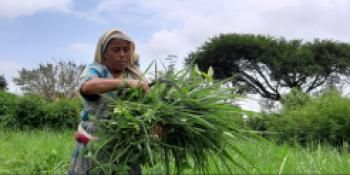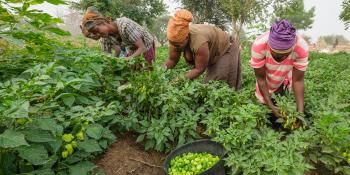New papers highlight the need for a gendered approach to policy and development

A round-up of recent publications examine the impact of climate change on health, livelihoods, and food security through a gendered lens.
“The threats of climate change are not gender-neutral,” a recent discussion paper titled Men, Masculinities & Climate Change proclaimed. While women and girls, especially from developing countries, have contributed the least to carbon emissions, they, and other marginalized groups, can expect to experience a disproportionate amount of the climate change burden. Another paper, produced by the United Nations Framework Convention on Climate Change (UNFCCC) succinctly explained the reasons behind the unequal burden, saying “the inequitable distribution of rights, resources, power and norms constrains many people’s ability to take action on climate change. This is especially true for women and vulnerable groups.”
These and other papers were included in a recent round-up of publications collected by the Eldis Climate Change and Development Reporter. The papers examine the impact of climate change on health, livelihoods, and food security through the lens of gender. A discussion of gender-inclusive approaches to policy and program development were also included by a number of the featured papers as a method of ensuring that the needs of women and girls are met.
According to the International Panel on Climate Change (IPCC), the threat to health may be the most devastating side effect of a warming planet. The IPCC warns that by 2050, illnesses and death associated with changing weather patterns will be the most pronounced impact of climate change. Climate change threatens to increase the instances of infectious diseases, such as malaria, reduce agricultural productivity, and serve as a catalyst for destruction and loss of human life through extreme weather events. While men and women are both vulnerable to these scenarios, research has indicated that in areas of pronounced gender inequality, women are four times more likely to die in a flood, 14 times more likely to die in a natural disaster, and are often more likely to experience food insecurity. Read more: Protecting Women’s and Children’s Health From a Changing Planet
Agriculture is also an essential component of climate change adaptation and mitigation as it both contributes to carbon emissions and will be deeply impacted by changing weather. Worldwide, agriculture and food production is responsible for an estimated one-third of carbon emissions and, as the global population continues to rise, food production will need to increase. At the same time, volatile weather patterns and a changing climate will wreak havoc on agriculture production, which not only threatens food security, but is devastating to agriculture-based livelihoods, which a substantial number of women around the world depend on.
There are, however, steps to be taken that can reduce the impact of climate change on women and girls. One approach to sustainably produce food is via climate-smart agriculture (CSA) which seeks to help farmers adapt to their changing environment while reducing agriculture’s role in emission production. CSA will not be truly transformative, however, if it presents itself as a purely technical solution to agriculture’s climate change woes. Instead, to be truly successful, Sonja Vermeulen argues that CSA should incorporate the gender politics behind access to resources and decision-making and highlight the role of women as leaders. Read more: Closing the gender-gap in climate-smart agriculture
Gender-inclusive policy and development strategies, which include women in positions of leadership, will also be key components of adaptation. A study from Peru found that when women were included in the decision-making process, local government approaches to climate adaption were more inclusive of women. Read more: How do gender approaches improve climate compatible development? Lessons from Peru
Policy analysts and development professionals looking for methods of incorporating a gendered-perspective into their work will also find featured papers helpful. A featured paper contributed by the CGIAR Research Program on Climate Change, Agriculture and Food Security (CCAFS) features a development rubric for policy evaluation. The rubric identifies effective policies as those that rely on research and data that explicitly examine gender, the inclusion of diverse stakeholders in policy formulation, and allotted funds to not only implement gender-inclusive policies, but also to evaluate and monitor them. Read more: Influencing gender - inclusive climate change policies in Latin America
Similarly, the Pacific Gender & Climate Change Toolkit works to integrate gender into programs and policy. The toolkit works through four modules to serve as an introduction to gender and climate change and the links between the two. The toolkit also suggests methods of introducing gender into each phase of a project and how gender-sensitive perspective can be incorporated into policy, institutions, and funding for climate change adaptation. Read more: The Pacific Gender & Climate Change Toolkit: tools for practitioners
While gender-inclusive frameworks and policies are an essential component in climate change mitigation, it is also imperative that women have an active role in policy creation and implementation. The research included in this collection of papers is one step towards assuming these goals while, at the same time, providing practical tools for helping women combat the growing pressures placed on them by climate change.
Kathlee Freeman is Communications Assistant at CCAFS Gender and Social Inclusion Flagship.



